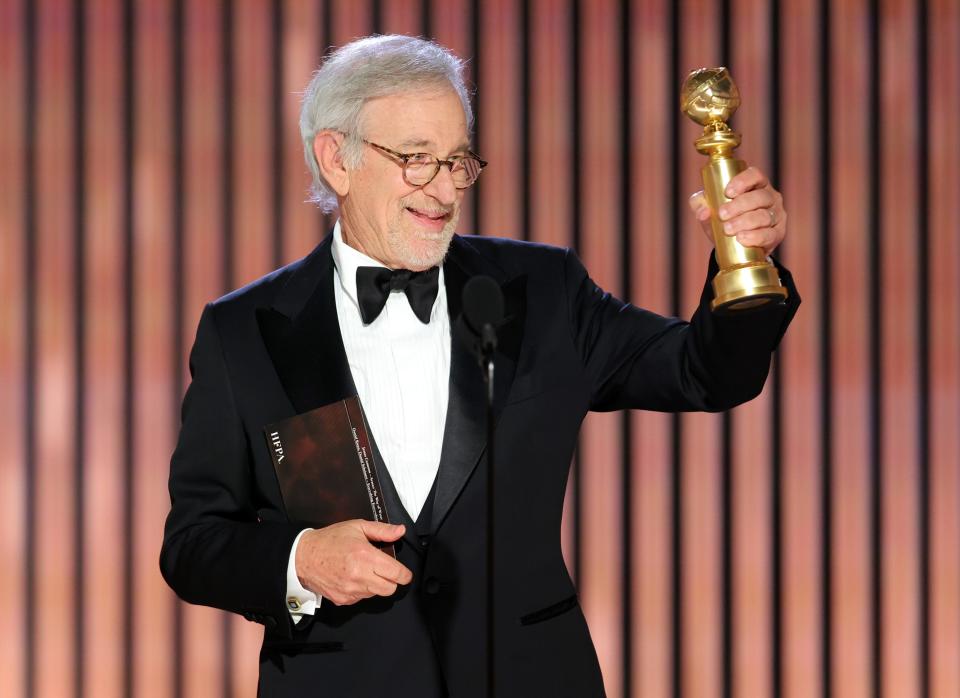Spielberg’s 'The Fabelmans' is a tribute to the power of art to make sense of our lives
- Oops!Something went wrong.Please try again later.
- Oops!Something went wrong.Please try again later.
I was happy to see Steven Spielberg’s latest film “The Fabelmans” win a few high-profile Golden Globes on Tuesday.
I’ve not yet hammered out what I consider the top ten movies of last year – something I often tend to do as a film buff every January – but when the time comes, I expect “The Fabelmans” to be at the top, right up there with the trippy, heartwarming and action-packed comedy, “Everything Everywhere All At Once,” which also had a good night at the Globes.
“The Fabelmans” won Best Drama Motion Picture, and Spielberg took the Best Director award. If he wins the same accolade at the Academy Awards in a few weeks, it will be his third Oscar, joining the ones he won for “Schindler’s List” in 1994 and “Saving Private Ryan" in 1999.

Sure, let’s get the obligatory sniff out of the way. These awards do not mean anything to anybody who is not a part of the film industry. And the ceremonies at which they are awarded are bloated, boring, indulgent and self-congratulatory.
But if you love movies, as I do, it’s still a joy to see the best of them recognized - to see such exemplars of the art form celebrated and their place in film history cemented.
An insightful, absorbing and beautifully acted film, “The Fabelmans” is presented as fiction but is undeniably a semi-autobiographical account of Steven Spielberg’s life, from his childhood, made difficult by anxiety, family strife and anti-Semitism, to that moment he showed up on a Hollywood lot, eager to begin his career.
The film ends on just the right note. If it had continued to include the main character conquering the world by making a blockbuster about, say, a man-eating shark, then the story would have crossed over into cringing self-indulgence.
I loved the movie when Valerie and I saw it with another couple at a theater a few weeks ago. I consider it Spielberg’s best film in several years and his most emotionally engaging one since “Saving Private Ryan.”
'The Fabelmans' review:Steven Spielberg puts his life on screen, in rousing fashion
Not that the film is an across-the-board crowd-pleaser. I know one person who saw the film and outright hated it – who considered it self-indulgent garbage. I suppose there's a chance this friend is not alone in her sentiment. With “The Fabelmans,” a filmmaker has made a movie about himself.
True. But I do not believe Spielberg wanted to make a film to celebrate the lore of his career or help lock down his place in film history. He doesn’t need to do that. “Jaws," “Close Encounters of the Third Kind," “Raiders of the Lost Ark," “E.T.” and so many other of his classic films have already done that for him.
This is pure speculation, but I say the reason why Spielberg made a film about his life is right there in the first 15 minutes of the film itself.
In the opening scenes, Sammy Fabelman – the Spielberg character – goes to the movies to see “The Greatest Show on Earth” with his parents. A scene involving a train wreck seems to rattle and fascinate him at the same time, enough so that he needs to work through the anxiety he’s experiencing as a result of witnessing the spectacle.
Sammy gets a train set. Then he gets a camera. And then he stages his own train wreck on film, and does a rather impressive job. Filming the wreck – thinking it through, staging it, getting however many takes as necessary – allows Sammy to process what he saw, to understand and make sense of what he experienced when he saw the train disaster unfold on screen during “The Greatest Show on Earth.”

And that’s what Spielberg has done with “The Fabelmans.” The film is a wonderful example of how the best art is often cathartic and allows us to make sense of our lives and of life in general.
Anyone familiar with Spielberg’s biography knows the difficulties and pain he experienced as a child, with the divorce of his parents, his relationships with both of them, the disorientation of moving from place to place, and the prejudice he endured from his peers.
All of his career, Spielberg often blended escapism and wild fiction to explore his own painful memories and the themes that recurred in his youth. Biographers and film critics have long made the connection between Spielberg and the lonely suburban boy in “E.T.” and a certain world-famous archaeologist who liked to beat up the Nazis. And then, of course, there’s “Schindler’s List,” in which Spielberg turned away from fantasy and escapism and looked at the horrors and atrocities of history squarely in the eye.
And now, with “The Fabelmans,” Spielberg seems to have processed and made sense of his fascinating but difficult journey toward becoming a man and the most successful and beloved director of all time.
Just like Sammy did with the train set and that camera of his.
Shawn P. Sullivan is an award-winning columnist and is a reporter for the York County Coast Star. He can be reached at ssullivan@seacoastonline.com.
This article originally appeared on Portsmouth Herald: 'The Fabelmans' is a tribute to the power of art to make sense of life

